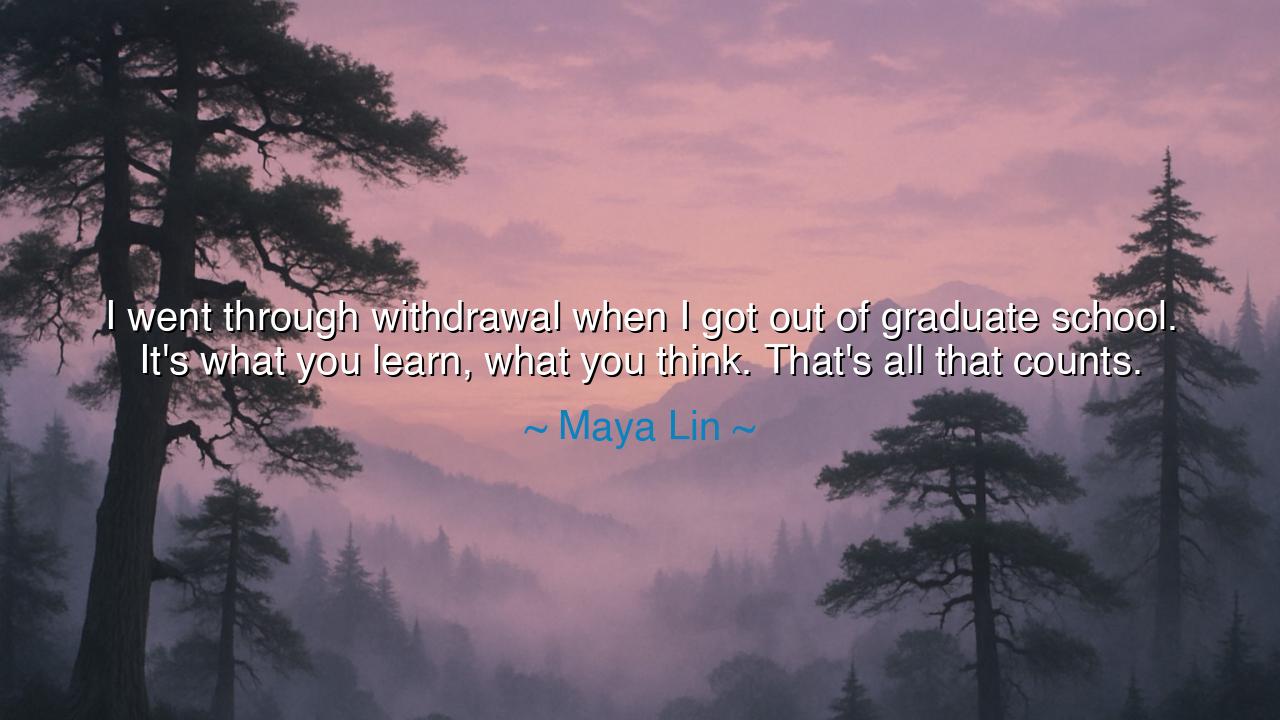
I went through withdrawal when I got out of graduate school. It's
I went through withdrawal when I got out of graduate school. It's what you learn, what you think. That's all that counts.






The words “I went through withdrawal when I got out of graduate school. It's what you learn, what you think. That's all that counts” spoken by Maya Lin carry the quiet weight of reflection, capturing the profound transition from structured learning to the openness of life beyond academia. Beneath the phrase “went through withdrawal” lies the recognition that the mind becomes intoxicated by knowledge, by the thrill of ideas, and by the constant engagement of thought. Lin reminds us that education is not merely a collection of credentials or a pathway to career, but a life-altering process of thinking, questioning, and understanding, a gift that remains long after the classroom has ended.
In the style of the ancients, one might hear echoes of Socrates or Aristotle, who emphasized that the cultivation of thought and reflection is the highest pursuit. To emerge from graduate study is to step from a concentrated crucible of learning into the wider world, where the intensity of intellectual engagement diminishes and the mind feels a profound emptiness. Lin’s description of withdrawal is akin to the philosopher’s lament when separated from the life of inquiry: the craving for knowledge, the constant dialogue of ideas, is a form of sustenance that the soul soon misses.
The origin of this insight lies in Lin’s own journey as a student of architecture and art, where the demands of graduate school were both rigorous and immersive. Within the academy, she was enveloped by mentors, peers, and ideas that challenged and expanded her understanding. The intensity of graduate education creates an intellectual ecosystem, and leaving it can feel like withdrawal from a necessary and exhilarating nourishment. Her words emphasize that the true value of education is not the diploma, but the cultivation of thought, perspective, and awareness.
History offers profound parallels. Consider Leonardo da Vinci, who immersed himself in studies of anatomy, mechanics, and art. When his apprenticeship concluded or commissions ended, he often experienced a similar longing for intellectual engagement, for the interplay of ideas and the challenge of problem-solving. Similarly, Isaac Newton, after leaving Cambridge for periods of independent study, reported the exhilaration of discovering principles and thinking through complex problems. In each case, the withdrawal from structured learning underscored the true treasure of education: the life of the mind itself.
Lin’s statement also illuminates a crucial philosophical truth: what one learns and how one thinks are the enduring fruits of education. Diplomas, accolades, or societal recognition are ephemeral, but the ability to reason, to question, and to synthesize knowledge persists. By emphasizing that “that’s all that counts,” Lin elevates intellectual cultivation above external markers of success. Education becomes not a preparation for life, but a life in itself — an ongoing engagement with the world through thought.
Dear listener, the lesson is profound: cherish what you have learned and the habits of mind you have developed. Understand that the richness of your intellectual life is a treasure not measured by status or income, but by clarity of thought, depth of understanding, and capacity for critical reflection. When leaving an intense learning environment, do not despair; instead, recognize that the mind now holds the tools for a lifelong journey of insight and creation.
Take this wisdom into your own life: cultivate curiosity, nurture the habit of thinking deeply, and carry the lessons of education into all endeavors. Engage with ideas, question assumptions, and seek understanding not for external recognition, but for the enrichment of your own mind and spirit. The mind trained in graduate study, in contemplation, and in inquiry is a gift that remains with you for a lifetime.
Finally, let Maya Lin’s words guide both thought and action: value what you learn, treasure how you think, and recognize that intellectual engagement is itself a form of sustenance. Withdrawal from formal study is not loss, but a transition into the world where the mind, once disciplined and nourished, now exercises its power independently. In the cultivation of thought, in the act of reasoning and reflecting, the true essence of education endures, shaping not only careers, but the very character of the soul.






AAdministratorAdministrator
Welcome, honored guests. Please leave a comment, we will respond soon